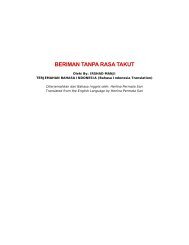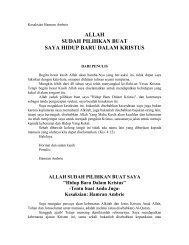A Critical Analysis of 'Real Islam'. Its People ... - Bukti dan Saksi
A Critical Analysis of 'Real Islam'. Its People ... - Bukti dan Saksi
A Critical Analysis of 'Real Islam'. Its People ... - Bukti dan Saksi
Create successful ePaper yourself
Turn your PDF publications into a flip-book with our unique Google optimized e-Paper software.
against Jews is also persistent: Jewish buildings blown up in Argentina, France, and elsewhere, Daniel<br />
Pearl's murder in Pakistan and other Jews targeted for stabbings worldwide. The essential training <strong>of</strong> their<br />
young to vilify Jews and Westerners continues to serve as the psychological preparation for this kind <strong>of</strong><br />
murder and mayhem against Jews, and now against Americans, and tomorrow against Japanese, Chinese,<br />
Australians, New Zealanders, Vietnamese, etc etc etc, …and on and on, …until the vision <strong>of</strong> the whole<br />
world as Islamic is achieved. To decide if Islam promotes bigotry and racism, the rules governing killing<br />
<strong>of</strong> non-Muslims should always be compared to the following Islamic rule governing the killing <strong>of</strong><br />
brothers enshrined in the Qur’an:<br />
And whosoever killeth a believer intentionally, his recompense shall be Hell, he shall abide therein and God's<br />
wrath shall be on him and His curse, and (there) is prepared for him a great torment (4:93)<br />
The Qur’an on Relations with Non-Muslim Family Members:<br />
Earlier it was pointed out that Muslims broke ties <strong>of</strong> allegiance and friendship with allied tribes and<br />
near family members. The Qur’an takes this a step further. Sura 58:22 shows that family blood ties are<br />
broken. Islam has an anti-family element, causing Muslims to fight and kill relatives if they reject<br />
Muhammad’s rule. The principals (and purpose) governing Muslim conduct with non-believing relatives<br />
will be further studied in the chapter "The Psychology <strong>of</strong> Jihad".<br />
Muslims who Leave Islam<br />
Just as Christians organizing against the core belief in Jesus Christ are no longer considered<br />
Christians, Muslims who actively oppose Muhammad’s declarations and example <strong>of</strong> jihad would have<br />
ceased to be Muslims. But Islam goes well beyond that concept <strong>of</strong> losing fellowship. Sharia (Islamic law)<br />
is based on the Qur’an, the example <strong>of</strong> Muhammad (sunna) and the consensus (idjmaa). Under this law,<br />
anyone falling away from faith in Islam commits an "unforgivable sin". Such "apostates" must be taken<br />
into custody by force, and called on to repent. Anyone so confronted and who does not immediately<br />
repent and turn back to Islam has forfeited his life, and is to be put to death by the state. While this is not<br />
carried out on a regular basis in the many Islamic lands practicing Sharia, the threat is ever present.<br />
Su<strong>dan</strong>, and Mauritania address the issue <strong>of</strong> apostasy in their penal codes. In the Su<strong>dan</strong>ese Penal Code <strong>of</strong><br />
1991, article 126. 2, we read: "Whoever is guilty <strong>of</strong> apostasy is invited to repent over a period to be<br />
determined by the tribunal. If he persists in his apostasy and was not recently converted to Islam, he will<br />
be put to death." The Penal Code <strong>of</strong> Mauritania <strong>of</strong> 1984, article 306 reads: "…All Muslims guilty <strong>of</strong><br />
apostasy, either spoken or by overt action will be asked to repent during a period <strong>of</strong> three days. If he does<br />
not repent during this period, he is condemned to death as an apostate, and his belongings confiscated by<br />
the State Treasury".<br />
In the Hadith there are many references demanding the death penalty for apostasy. According to Ibn<br />
Abbas the Prophet said, "Kill him who changes his religion", or "behead him". The only serious argument<br />
is as to the method and timing <strong>of</strong> death penalty implementation. There is a logical reason why<br />
Muhammad dictated that apostasy rank so high an <strong>of</strong>fence as to be worthy <strong>of</strong> the death penalty.<br />
Muhammads Islam was largely a military movement in the 7th, 8th and 9th centuries, so he saw apostasy<br />
as a defection to the enemy. Traitors in military campaigns were always executed by military<br />
organizations <strong>of</strong> that region and others, and Islam was and is a warrior’s faith designed to support military<br />
campaigns. One <strong>of</strong> Islam’s most respected theologians and prolific writers in the last century, Pakistani<br />
Abu’l Ala Mawdudi, insists that both Qur’an and Hadith demand an apostate’s execution. He quotes the<br />
Qur’an (9:11-12) and the canonized Hadith: "Any person, i.e. Muslim, who has changed his religion, kill<br />
him" (Al-Bukhari, Vol. 9, p. 45). The Islamic scholar, Majid Khadduri, agrees that Qur’anic<br />
commentaries say a believer who turns back from his religion must be killed if he persists in disbelief (p.<br />
150).<br />
Muhammad was not content to conquer by force, or kill those that merely opposed him physically or<br />
verbally; he also taught that Muslims who leave the Islamic faith are to be murdered. Here are some more<br />
quotes from Bukhari's collection <strong>of</strong> Hadith. Remember, Bukhari's Hadith is the second most important<br />
writing in Islam, following the Qur’an.<br />
Bukhari, volume 9, #17





